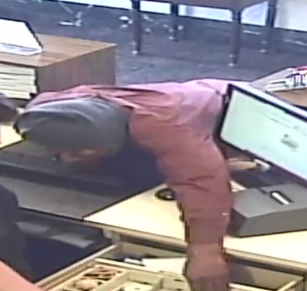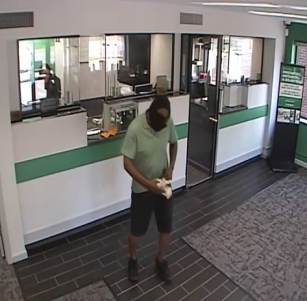DOJ News Release:
Jury Convicts State Lawmaker of COVID-19 Fraud Scheme at Springfield Health Care Charity
Also Convicted of Stem Cell Fraud Scheme, Illegally Distributing Prescription Drugs
SPRINGFIELD, Mo. – A Missouri state representative was convicted by a federal trial jury today for a nearly $900,000 COVID-19 fraud scheme, as well as a separate $200,000 fraud scheme in which she made false claims about a fake stem cell treatment marketed through her clinics in southern Missouri, and for illegally providing prescription drugs to clients of those clinics.
“This is an elected official who stole money from the public, a purported humanitarian who cheated and lied to her patients, and a medical professional who illegally distributed drugs,” said U.S. Attorney Teresa Moore. “She violated her position of trust to selfishly enrich herself at the expense of others. But a jury of her peers, in a unanimous verdict, saw through her smokescreen of excuses and ridiculous claims, and now she will be held accountable for her criminal behavior.”
Patricia “Tricia” Ashton Derges, 64, of Nixa, Mo., was found guilty of 10 counts of wire fraud, 10 counts of distributing drugs over the internet without a valid prescription, and two counts of making false statements to a federal law enforcement agent.
Derges was elected in November 2020 as a Missouri state representative in District 140 (Christian County). Derges, who is not a physician but is licensed as an assistant physician, operates three for-profit Ozark Valley Medical Clinic locations in Springfield, Ozark, and Branson, Mo. Derges also operates the non-profit corporation Lift Up Someone Today, Inc., with a medical and dental clinic in Springfield.
“Derges betrayed the confidence entrusted in her as both an elected lawmaker and an assistant physician,” said Charles Dayoub, Special Agent in Charge of FBI Kansas City. “She took advantage of a global pandemic to benefit herself financially with complete disregard, not only to her constituents, but to the oath she took as a health care professional to do no harm. Today’s verdict, decided by a jury of her peers, is a direct message to those who wish to profit on the backs of others: the FBI will vigorously pursue any individual who abuses their position of power and the trust of Missourians for their own gain.”
“By putting personal profit before the health and welfare of her constituents, this official egregiously violated the duties of her position as an elected public servant,” said Curt L. Muller, Special Agent in Charge with the Department of Health and Human Services, Office of Inspector General (HHS-OIG). “HHS-OIG will not tolerate any attempts to defraud federal health care programs, particularly those that steal from essential taxpayer funds and endanger public health.”
COVID-19 Fraud Scheme
Derges was convicted of three counts of wire fraud related to her attempt to fraudulently receive nearly $900,000 in CARES Act funds. Derges actually was awarded $296,574 in CARES Act funds for Lift Up, although Lift Up did not provide any COVID-19 testing services to its patients. In fact, Lift Up’s medical clinic closed at the beginning of the COVID-19 pandemic and remained closed from March to June 2020.
Derges sought CARES Act funding for COVID-19 testing that had been provided, and already paid for, at her for-profit Ozark Valley Medical Clinic. Derges requested reimbursement for $379,294 in COVID-19 testing and related expenses, and future funding in the amount of $503,350. In total, Derges applied for $882,644 from the CARES Act Relief Fund on Lift Up’s behalf.
Congress passed the Coronavirus Aid, Relief, and Economic Security (CARES) Act in March 2020, which provided $150 billion to states, tribal governments, and units of local government. Missouri was allocated approximately $2.3 billion. Missouri allocated approximately $34 million in CARES Act funds to Greene County. To administer the CARES Act funds it received, the Greene County Commission created the CARES Act Relief Fund to “promote recovery by funding programs and services that support the needs of those impacted by the COVID-19 public health emergency.” An advisory council of 30 citizen volunteers was appointed to review funding requests and make funding recommendations to the Greene County Commission.
Derges claimed in her application to the Greene County CARES Act Relief Fund that Lift Up provided COVID-19 testing and she sought reimbursement for “COVID-19 eligible expenses” that Lift Up had incurred. To support her claim, Derges provided invoices totaling $296,574 from Dynamic DNA for more than 3,000 COVID-19 laboratory tests. Derges submitted the Dynamic DNA invoices as Lift Up expenditures, although they were actually for testing done at Derges’s for-profit Ozark Valley Medical Clinic.
Lift Up, a non-profit charity, and Ozark Valley Medical Clinic, a for-profit corporation, are separate legal entities. Ozark Valley Medical Center had already received payment from its clients of approximately $517,000 for these COVID-19 tests. Ozark Valley Medical Center charged clients, patients, or their patients’ employers approximately $167 per sample for its COVID-19 testing services. Derges concealed from Greene County that these COVID-19 tests had already been paid for by other payors.
In December 2020, the Greene County Commission awarded Lift Up $296,574 in CARES Act funding based upon Lift Up’s fraudulent application and the Dynamic DNA invoices Derges had submitted. Derges deposited the check into Lift Up’s bank account, then transferred the funds into Ozark Valley Medical Center’s bank account.
Derges provided several more invoices from Dynamic DNA to Greene County later in December 2020 to further support her application for Lift Up, although the invoices were actually for testing done for clients at Ozark Valley Medical Center, raising the total to $589,143 for 6,177 COVID-19 tests. Derges concealed from Greene County that Ozark Valley Medical Center already had been paid approximately $1 million by clients, patients, or their patients’ employers, for these COVID-19 tests.
Stem Cell Fraud Scheme
Derges also was convicted of seven counts of wire fraud related to a nearly $200,000 fraud scheme, which lasted from December 2018 to May 2020. Derges marketed a stem cell treatment that actually utilized amniotic fluid that did not contain any stem cells. The federal indictment charged her with defrauding four specific victims, each of whom testified during the trial.
Derges exclusively obtained amniotic fluid, which she marketed under the name Regenerative Biologics, from the University of Utah. Derges advertised Ozark Valley Medical Clinic as a “Leader in … Regenerative Medicine,” including stem cells, and marketed her “stem cell” practice through seminars, media interviews, and social media. Derges made similar claims in personal consultations.
In fact, however, the amniotic fluid Derges administered to her patients did not contain mesenchymal stem cells, or any other stem cells. The amniotic fluid she obtained from the University of Utah was a sterile filtered amniotic fluid allograft (a tissue graft comprised of human amniotic membrane and amniotic fluid components derived from placental tissue). The amniotic fluid allograft was “acellular,” meaning it did not contain any cells, including stem cells.
Despite being told that the University of Utah’s amniotic fluid allograft was “acellular” and did not contain mesenchymal stem cells, Derges continued to tell her patients and the public that the amniotic fluid allograft contained stem cells.
Derges administered amniotic fluid, which she falsely claimed contained stem cells, to patients who suffered from, among other things, tissue damage, kidney disease, chronic obstructive pulmonary disease (COPD), Lyme disease, and urinary incontinence. In an April 11, 2020, Facebook post Derges wrote of amniotic fluid allograft: “This amazing treatment stands to provide a potential cure for COVID-19 patients that is safe and natural.”
The University of Utah sold its amniotic fluid allograft to Derges for approximately $244 per milliliter and $438 for two milliliters. Derges charged her patients $950 to $1,450 per milliliter. In total, Derges’s patients paid her approximately $191,815 for amniotic fluid that did not contain stem cells.
Controlled Substances Act
Derges also was convicted of 10 counts of distributing Oxycodone and Adderall over the internet without valid prescriptions. The indictment alleges that Derges, without conducting in-person medical evaluations of the patients, wrote electronic prescriptions for Oxycodone and Adderall for patients and transmitted them to pharmacies over the internet.
Because none of the assistant physicians whom Derges employed at Ozark Valley Medical Clinic could prescribe Schedule II controlled substances, it was the standard practice of the assistant physicians to see a patient and later communicate to Derges the controlled substances they wanted her to prescribe to their patients. Derges, without conducting an in-person medical evaluation of the patients as required by federal law, wrote electronic prescriptions for the patients and transmitted the prescriptions over the internet to pharmacies.
False Statements
Derges also was convicted of two counts of making false statements to federal agents investigating this case in May 2020.
Derges told agents that the amniotic fluid allograft that she used in her practice contained mesenchymal stem cells, which she knew was false. Derges also told federal agents that she had not treated a patient for urinary incontinence with amniotic fluid allograft, which she knew was false.
Assistant Physician
Derges is not a physician but is licensed as an assistant physician. An assistant physician is a mid-level medical professional in the state of Missouri. Under Missouri law, medical school graduates who have not been accepted into a residency program but have passed Step 1 and Step 2 of the United States Medical Licensing Examination may apply to become an assistant physician. State law mandates that assistant physicians practice pursuant to a collaborative practice arrangement with a licensed physician.
Derges obtained her medical degree from the Caribbean Medical University of Curacao in May 2014 but was not accepted into a post-graduate residency program. Derges was licensed as an assistant physician by the state of Missouri on Sept. 8, 2017.
Following the presentation of evidence, the jury in the U.S. District Court in Springfield, Mo., deliberated for about six hours over two days before returning guilty verdicts on all counts to U.S. District Judge Brian C. Wimes, ending a trial that began Monday, June 13.
Under federal statutes, Derges is subject to a sentence of up to 20 years in federal prison without parole on each of the 10 wire fraud counts and on each of the 10 drug distribution counts, and a sentence of up to five years in federal prison without parole on each of the two false statements counts. The maximum statutory sentence is prescribed by Congress and is provided here for informational purposes, as the sentencing of the defendant will be determined by the court based on the advisory sentencing guidelines and other statutory factors. A sentencing hearing will be scheduled after the completion of a presentence investigation by the United States Probation Office.
This case is being prosecuted by Assistant U.S. Attorney Shannon Kempf and Supervisory Assistant U.S. Attorney Randall D. Eggert. It was investigated by the FBI, Health and Human Services – Office of Inspector General, the DEA and the Missouri Attorney General’s Medicaid Fraud Control Unit.


